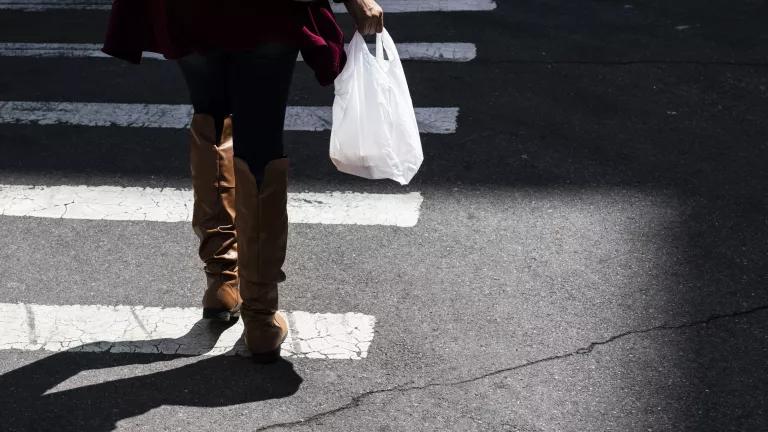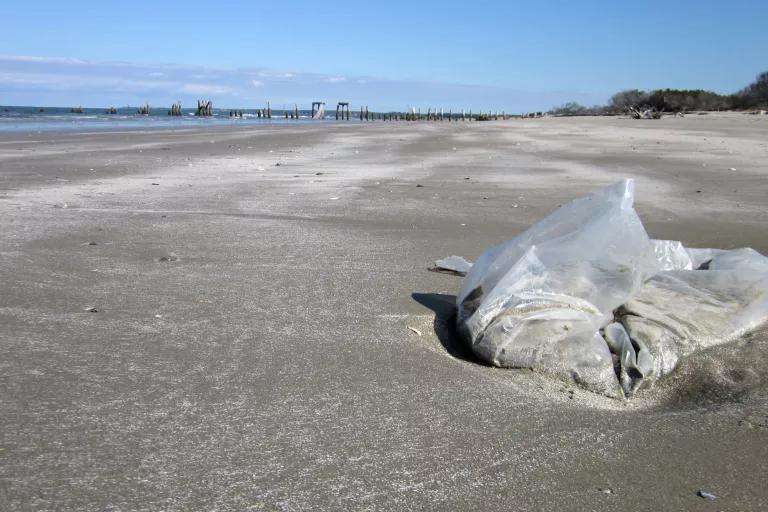Do Plastic Bag Bans Work?
NRDC scientist Jennifer Sass says yes and debunks the skeptics’ claim that in trying to wean ourselves off plastic bags, we’re only creating more troubles.

Q: Recent reports are claiming that plastic bag bans have unintended environmental consequences—causing a spike in the use of paper and tote bags, which may result in even more pollution. What’s the real story?
A: In an effort to stem the swelling tide of ocean pollution, plastic bag bans are sweeping across the country—but not everybody’s on board. Perhaps you, too, heard the news reports (like this recent NPR Planet Money episode) praising those flimsy, single-use grocery bags and knocking the benefits of reusables. Let’s take a closer look at a few circulating claims and break down some of the misinformation behind them.

Myth 1: Paper bags are worse for the environment than plastic bags.
REALITY: Let’s be clear: Environmentalists don’t see switching to single-use paper bags as the solution to kicking our plastic habit. That’s why any good plastic bag ban attempts to avoid a surge in paper bag use by also implementing a paper bag fee, ideally nudging shoppers to bring bags from home instead. After all, growing trees for paper uses up a lot of water and fertilizer. But when we make bags from recycled paper, their impact lessens, since recycled content uses far fewer resources (trees, energy, water, and chemicals) than virgin fiber content. Another plus? Paper bags are readily recyclable or compostable. That’s not true of single-use plastics, which “become the pollution we see on our streets, in our waterways, and eventually in our oceans,” says NRDC scientist Jennifer Sass. Paper ultimately breaks down, whereas the 13 million tons of plastic that make their way into our oceans each year do not.

Myth 2: Reusable tote bags are worse for the environment than plastic bags.
REALITY: Certainly, something durable will require more resources to produce than something designed to survive just a few minutes. But numerous studies looking at the impact of reusable totes on the climate assume people make very limited use of these bags. (Their authors also tend to focus on carbon emissions, which is only one facet of any given product’s full environmental impact.) This 2018 life-cycle study by the Danish government concluded that a cotton tote must be reused 52 times to bring its carbon footprint below that of a single-use plastic bag. Considering all the uses we have for our totes—for many of us, they are a constant companion throughout our daily routine—such a threshold is easily exceeded within just a few months. Avoiding single-use bags also helps you do your part to keep plastic bags out of the waste stream, an urgent goal for which we must all take responsibility.
Of course, to get the most value out of your reusable bag, the kind you carry does matter. Start with one that’s durable. “The more times you can use it, the more right it is for you,” Sass says. Then consider its recycled content. “That could be a paper bag, plastic, or cloth. More recycled content makes it a better choice.” (Even better is a bag that’s also produced organically—and bonus points if you can recycle or compost it at the end of its life.)
Myth 3: Plastic bag bans cause such a large spike in garbage bag sales that they’re ineffective.
REALITY: The NPR Planet Money episode references a 2019 study that flagged a complicated issue: Those single-use plastic bags were often used a second time for pet waste or lining trash bins. So a team of researchers wondered, would a plastic bag ban lead to a rise in purchases of pet waste bags and other plastics? To answer the question, they camped out in grocery stores in California, collecting data on consumer habits. Sure enough, the study confirmed that sales of trash bags ticked up following the implementation of plastic bag bans. But total plastic usage was still at a net negative. In fact, the study found that even after accounting for the bump in garbage bag sales, we still used 70 percent less plastic overall. That’s a considerable win.
Despite all this, some people will continue to defend plastic bags because they see packing a tote before heading to the store as just another chore. Which is why we propose a fourth R to the “reduce, reuse, recycle” adage: Remember. It’s a worthwhile task.
This NRDC.org story is available for online republication by news media outlets or nonprofits under these conditions: The writer(s) must be credited with a byline; you must note prominently that the story was originally published by NRDC.org and link to the original; the story cannot be edited (beyond simple things such as grammar); you can’t resell the story in any form or grant republishing rights to other outlets; you can’t republish our material wholesale or automatically—you need to select stories individually; you can’t republish the photos or graphics on our site without specific permission; you should drop us a note to let us know when you’ve used one of our stories.

“Forever Chemicals” Called PFAS Show Up in Your Food, Clothes, and Home
What Are the Solutions to Climate Change?
Her Stand-Up Paddleboard Is a Platform for Campaigning Against Plastic Pollution